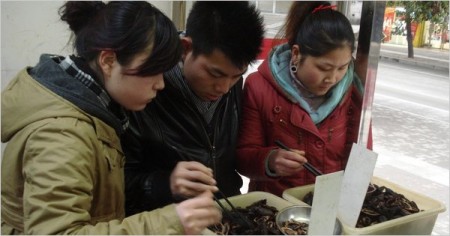Source: The New York Times
Author: Dan Levin
XIANGTAN, China — If the residents of this city seem a bit lively on even the hottest days or most frigid nights, check their mouths. That minty scent and cracking sound come from a fragrant pick-me-up that men, women and even children chew from breakfast until bedtime.
The source of their euphoria is “binglang,” the dried fruit of the areca palm, sometimes referred to as betel nut, which sets the nervous system buzzing and warms the body, especially after a large banquet.
“It helps with digestion and sobers you up,” said Xie Shuo, a cellphone repairman who added he consumed 100 pods a day. He smiled to reveal blackened gums and stained teeth, one of the less attractive side effects of chewing the fruit. “I’m addicted to binglang, but I really love it so it’s not a problem,” he said.
That is a sentiment shared by many of Xiangtan’s one million residents, whose fondness for the treat has fueled the city’s prosperity. The city, in Hunan Province, is China’s leading commercial producer of binglang. Its manufacturers import the fresh ingredients, mostly from the island province of Hainan, and sell the dried husks across Hunan — and to a lesser extent elsewhere.
The $1.18 billion industry employs more than 100,000 people in Xiangtan County. No wonder the city government has asked for the area’s seven factories and nearly 50 workshops to increase production to keep the local economy humming through the global financial crisis.
But the addictive treat has a downside, ruining mouths when chewed and soiling sidewalks when spat out.
In many parts of Asia, the fresh areca nut is chewed, sometimes wrapped in betel leaf or with tobacco, a habit that has been linked to higher rates of oral cancer. Hunan residents prefer to eat just the preserved husk, which seems to deter the fruit’s carcinogenic effects, according to recent studies. But local dentists and doctors denounce the practice, saying it can cause other mouth diseases.
Still, binglang is a symbol of pride to residents, business leaders and local officials, who wave off suggestions that the fruit is harmful.
“Binglang has helped Xiangtan make a name for itself,” said Li Lihua, 60, a veteran chewer of 40 years who sells bags of binglang for 75 cents each. “It’s like chewing gum but stronger, plus it kills parasites.”
Experts affiliated with the World Health Organization estimate that 80 percent of Xiangtan’s residents chew binglang. Many start around 10 years old, picking up the habit from parents who believe that it has powerful health benefits. According to traditional Chinese medicine, it aids digestion, removes plaque and expels worms.
Standing outside a boisterous arcade, Pan Bozhe, 24, was gleefully chewing some “Big Brother” binglang during a visit home from Guangdong Province, where he works as an electronics salesman. “I really miss this stuff the rest of the year, since they don’t sell it in Shenzhen,” he said, his jaw working furiously. “So whenever I come back to Xiangtan I chew as much as I can.”
Hunan’s love affair with binglang began more than 300 years ago, when, according to local lore, a magistrate promoted it as a cure for a plague that was sweeping the region. During China’s economic reforms of the early 1980s, Xiangtan began turning the pastime into profit, and these days processes more than 700 tons each year, according to the Hunan Binglang Association.
The city fathers speak of binglang as if it were a panacea for all of Xiangtan’s ills, from curing tapeworm to solving unemployment.
Just ask Li Xuejun 46, a binglang manufacturer who named his brand Enormous Blessing. His grandmother’s fondness for the desiccated fruit inspired him to break into the business in the mid-1990s, and he now sells $410,000 of binglang annually, employing 200 people. Sales have grown about 50 percent a year, he said, which he attributes to heavier advertising and more children taking up the habit of chewing binglang in mint, cinnamon and orange flavors.
With a cigarette hanging from his lips and binglang shells crunching between his molars, Mr. Li lounged in the back room of a restaurant here and extolled the virtues of the plant that has showered the city with jobs and sport utility vehicles and has sent its children to top universities.
Local medical experts have long been nudging the Xiangtan government to make binglang safer. Tang Jieqing, the vice director of the Xiangtan Stomatological Hospital, who has studied the area’s binglang habits for more than 10 years, believes that rates of mouth diseases like oral submucous fibrosis are higher in Xiangtan than elsewhere in China, and he wants the government to publicize binglang’s health risks.
While the local government set a production standard in 2004, “to be honest, it hasn’t been very supportive in a practical way,” Dr. Tang said, citing the lack of package warnings or other consumer information.
Noting the industry’s economic value, he added, “our government can be supportive of binglang, but one should never say that it’s very healthy.”
Shi Da contributed research.


Leave A Comment
You must be logged in to post a comment.